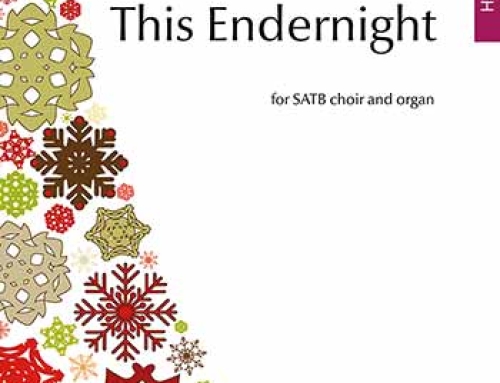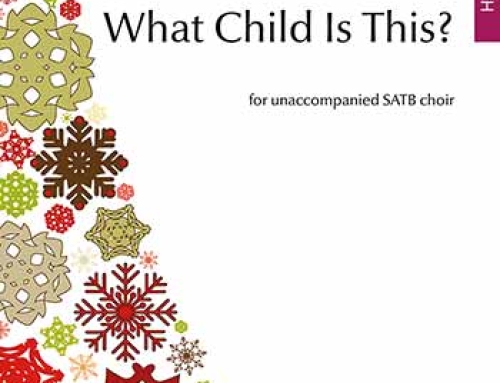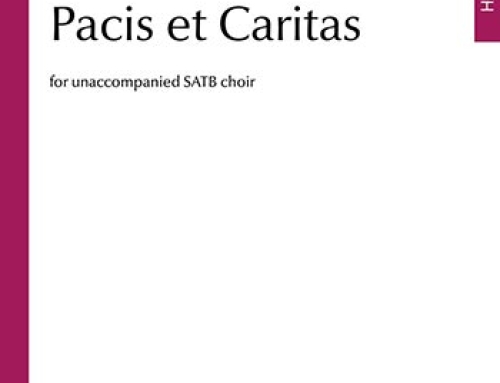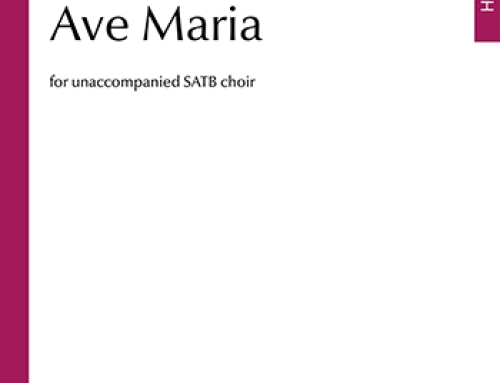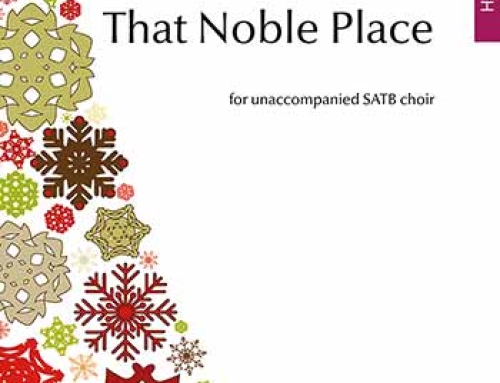Songs of Innocence
- Introduction
- The Shepherd
- The Echoing Green
- The Lamb
- The Little Boy Lost and Found
- A Cradle Song
- The Divine Image
- A Dream
- On Another’s Sorrow
- Duration: 35 minutes
- Chorus: SATB
- Instrumentation: Piano
- Published by: GIA Publications
This setting of nine of William Blake’s Songs of Innocence for choir and piano is testament to Patrick’s long affinity with the poems. Given the public’s renewed interest in Blake’s work, Patrick felt that now is the perfect time for their release.
The fragile poetry gives rise to a tender and heartfelt musical style heard from the outset in Introduction. Here, Blake sees himself as a piper and his poetry as melody and song. He becomes deeply moved and inspired by the vision of a child who urges him to sing and then write about innocent things which “every child may joy to hear.” The choir and piano alternate in a gentle and evocative interpretation of The Shepherd before dancing rhythms and figurations suggest children at play in The Echoing Green. In The Lamb the piano is dispensed with, giving way to simple four-part harmony together with high-voice solos. The tranquility is broken by the urgent calls of The Little Boy Lost and Found as a rolling piano accompaniment underpins a tale of fear and despair where the little boy eventually finds repose in the arms of a compassionate Father. The exquisite text of A Cradle Song inspires a warm lullaby with the solo soprano conveying a deep maternal love. The Divine Image aspires to create an angelic world where Mercy, Pity, Peace and Love become personified and offer sweet caresses to the listener. A Dream brings a period of light relief, with its playful tale of a beetle and a glow-worm, before the rich sonorities and floating melodies of On Another’s Sorrow bring the collection to a close. “Till our grief is fled and gone,” the choir sings as the piano descends into deep harmony, and we are left with an image of a God who is unable to stand passively by but can only “sit by us and moan.”
The Sheet Music for The Lamb and A Cradle Song is also available as standalone works.
N.B. This is Blake’s original text including his punctuation and grammar which differs from conventional use.
1. Introduction
Piping down the valleys wild
Piping songs of pleasant glee
On a cloud I saw a child.
And he laughing said to me.
Pipe a song about a Lamb:
So I piped with merry chear,
Piper, pipe that song again—
So I piped, he wept to hear.
Drop thy pipe thy happy pipe
Sing thy songs of happy chear,
So I sung the same again
While he wept with joy to hear.
Piper sit thee down and write
In a book that all may read—
So he vanish’d from my sight,
And I pluck’d a hollow reed.
And I made a rural pen,
And I stain’d the water clear,
And I wrote my happy songs,
Every child may joy to hear
2. The Shepherd
How sweet is the Shepherds sweet lot,
From the morn to the evening he strays:
He shall follow his sheep all the day
And his tongue shall be filled with praise.
For he hears the lambs innocent call.
And he hears the ewes tender reply.
He is watchful while they are in peace,
For they know when their Shepherd is nigh.
3. The Ecchoing Green
The Sun does arise,
And make happy the skies.
The merry bells ring,
To welcome the Spring.
The sky-lark and thrush,
The birds of the bush,
Sing louder around,
To the bells chearful sound,
While our sports shall be seen
On the Ecchoing Green.
Old John with white hair
Does laugh away care,
Sitting under the oak,
Among the old folk.
They laugh at our play,
And soon they all say,
Such such were the joys,
When we all girls & boys,
In our youth time were seen,
On the Ecchoing Green.
Till the little ones weary
No more can be merry
The sun does descend,
And our sports have an end:
Round the laps of their mothers,
Many sisters and brothers,
Like birds in their nest,
Are ready for rest:
And sport no more seen,
On the darkening Green.
4. The Lamb
Little Lamb who made thee
Dost thou know who made thee
Gave thee life & bid thee feed,
By the stream & o’er the mead;
Gave thee clothing of delight,
Softest clothing wooly bright;
Gave thee such a tender voice,
Making all the vales rejoice:
Little Lamb who made thee
Dost thou know who made thee
Little Lamb I’ll tell thee,
Little Lamb I’ll tell thee;
He is called by thy name,
For he calls himself a Lamb:
He is meek & he is mild,
He became a little child:
I a child & thou a lamb,
We are called by his name.
Little Lamb God bless thee,
Little Lamb God bless thee.
5. Little Boy lost
Father, father, where are you going
O do not walk so fast.
Speak father, speak to your little boy
Or else I shall be lost,
The night was dark no father was there
The child was wet with dew.
The mire was deep, & the child did weep
And away the vapour flew.
The Little Boy found
The little boy lost in the lonely fen,
Led by the wand’ring light,
Began to cry, but God ever nigh,
Appeared like his father in white.
He kissed the child & by the hand led
And to his mother brought,
Who in sorrow pale, thro’ the lonely dale
Her little boy weeping sought.
6. A Cradle Song
Sweet dreams form a shade,
O’er my lovely infants head.
Sweet dreams of pleasant streams,
By happy silent moony beams
Sweet sleep with soft down,
Weave thy brows an infant crown.
Sweet sleep Angel mild,
Hover o’er my happy child.
Sweet smiles in the night,
Hover over my delight.
Sweet smiles Mothers smiles
All the livelong night beguiles.
Sweet moans, dovelike sighs,
Chase not slumber from thy eyes,
Sweet moans, sweeter smiles,
All the dovelike moans beguiles.
Sleep sleep happy child,
All creation slept and smil’d.
Sleep sleep, happy sleep.
While o’er thee thy mother weep
Sweet babe in thy face,
Holy image I can trace.
Sweet babe once like thee,
Thy maker lay and wept for me
Wept for me for thee for all,
When he was an infant small.
Thou his image ever see.
Heavenly face that smiles on thee,
Smiles on thee on me on all,
Who became an infant small,
Infant smiles are his own smiles,
Heaven & earth to peace beguiles.
7. The Divine Image
To Mercy Pity Peace and Love,
All pray in their distress:
And to these virtues of delight
Return their thankfulness.
For Mercy Pity Peace and Love,
Is God our father dear:
And Mercy Pity Peace and Love,
Is Man his child and care.
For Mercy has a human heart
Pity, a human face:
And Love, the human form divine,
And Peace, the human dress.
Then every man of every clime,
That prays in his distress,
Prays to the human form divine
Love Mercy Pity Peace.
And all must love the human form,
In heathen, turk, or jew.
Where Mercy, Love & Pity dwell,
There God is dwelling too.
8. A Dream
Once a dream did weave a shade,
O’er my Angel-guarded bed,
That an Emmet lost it’s way
Where on grass methought I lay.
Troubled wildered and forlorn
Dark benighted travel-worn,
Over many a tangled spray,
All heart-broke I heard her say.
O my children! do they cry,
Do they hear their father sigh.
Now they look abroad to see,
Now return and weep for me.
Pitying I drop’d a tear:
But I saw a glow-worm near:
Who replied, What wailing wight
Calls the watchman of the night.
I am set to light the ground,
While the beetle goes his round:
Follow now the beetles hum,
Little wanderer hie thee home.
9. On Another’s Sorrow
Can I see anothers woe,
And not be in sorrow too.
Can I see anothers grief,
And not seek for kind relief.
Can I see a falling tear,
And not feel my sorrows share,
Can a father see his child,
Weep, nor be with sorrow fill’d.
Can a mother sit and hear,
An infant groan an infant fear—
No no never can it be.
Never never can it be.
And can he who smiles on all
Hear the wren with sorrows small,
Hear the small birds grief & care
Hear the woes that infants bear—
And not sit beside the nest
Pouring pity in their breast.
And not sit the cradle near
Weeping tear on infants tear.
And not sit both night & day,
Wiping all our tears away.
O! no never can it be.
Never never can it be.
He doth give his joy to all.
He becomes an infant small.
He becomes a man of woe
He doth feel the sorrow too.
Think not, thou canst sigh a sigh,
And thy maker is not by.
Think not, thou canst weep a tear,
And thy maker is not near.
O! he gives to us his joy,
That our grief he may destroy
Till our grief is fled & gone
He doth sit by us and moan.
Words: William Blake (1757 – 1827)



